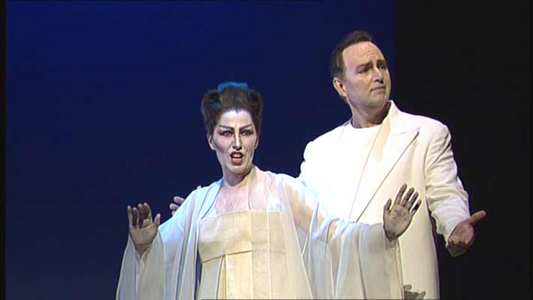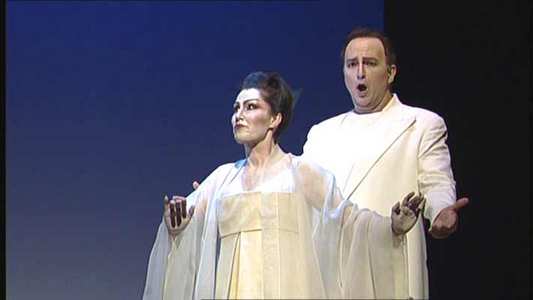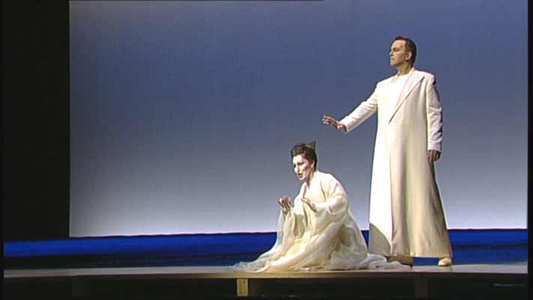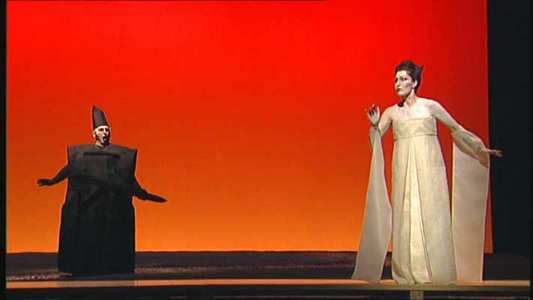Puccini: Madama Butterfly (de Waart)
Introduction
This performance of Puccini`s masterpiece was filmed at the Amsterdam Muziektheater in 2003, and is conducted by Edo de Waart.
The 19th century was the time when colonialism and imperialism were at their height. The US was just emerging as a world power and needed to find countries to draw into its sphere of influence which had not already been colonised by one of the European powers. Japan was such a country, but its highly refined and developed culture was one which foreigners found very difficult to understand.
Act 1
Cio-cio-san (Butterfly) is a 15 year old Geisha from the Nagasaki district who has been contracted to marry Lt. Benjamin Franklin Pinkerton of the US warship `Abraham Lincoln`. He isn`t in Japan for long, and just sees this `marriage` as a bit of fun for the duration of his stay, much like the contract on the house he has just taken out, which he has bought for 999 years but can cancel at any time. Needless to say, Butterfly has the opposite idea and sees this as her chance to better herself and become a good American housewife, abandoning her culture and gods. She has cut herself off from past and entrusted herself entirely to her husband and a supposed future in America.
Sharpless, the American consul in Nagasaki, has seen this and warns Pinkerton that Butterfly is taking things rather more seriously but Pinkterton will have none of it, and drinks a toast to his `real` American wife in the future.
Butterfly`s uncle, a Bonze (priest) arrives unnanounced and, while calling curses down upon her head, declares that she has renounced her faith and her ancestors, and so will now be renounced by all, even her closest relatives. Pinkerton is furious at the disturbance and throws everyone out, and contrives to comfort Butterly.
Act 2
Three years has passed since Pinkerton returned to the States after promising to return `when the robins nest`. Butterfly has waited patiently, watching for every foreign ship sailing into port, despite her maid Suzuki`s doubt.
Pinkerton is indeed returning, but with his American wife. He has written to Sharpless asking him to let Butterfly know. Sharpless visits Butterfly, but as soon as she hears of Pinkerton`s letter all she believes is that he is returning to her. They are interrupted by the arrival of Yamadori, a wealthy suitor. Everyone (including Goro, her original marriage broker) urges Butterfly to accept him, but she refuses, insisting the Pinkerton is coming back to her, despite the fact that the money he left her before he went has almost gone. Anyway, she reminds Yamadori that he seems to go through wives rather too frequently, and he agrees that all his divorces were bouts of `freedom`.
Sharpless tries once more to persuade her that Pinkerton will not be seeing her again. She introduces him to her little boy, who is Pinkerton`s son, and says that when he hears about him, he`ll come back quickly enough. Sharpless asks what she will do if she is wrong. Butterfly considers this for a moment, and then suggests returning to being a Geisha, or dying.
The port cannon is fired, and Butterfly recognises Pinkerton`s ship sailing into harbour. She and Suzuki decorate the house with petals and all three stay up to wait for Pinkerton`s return. Suzuki and the child fall alseep. Butterfly sits there motionless but wide awake. The morning arrives, and Suzuki persuades butterfly to get some sleep, promising her that she will fetch her if anything happens.
Pinkerton, Sharpless and Pinkerton`s wife arrive. They want to to take the boy from Butterfly to bring him up in America. Pinkerton is suitably full of remorse when he sees how Butterfly has remained faithful to him. He leaves, and Sharpless and Kate (Mrs. Pinkerton) have to deal with the matter.
Butterfly enters and notices people around the house. She realises the truth at last. She talks briefly to Kate, wishing her all the happiness in the world, and asks that they return to the house in half an hour to pick up the boy. Butterfly kills her self with her father`s sword on which is inscribed `To die with honour when one can no longer live with honour`. Pinkerton returns to the house to find her dead alongside his son, who is playing with his toys and waving a small American flag.

Video
This Opus Arte DVD is presented in 16:9 Anamorphic, Colours and lightning effects are nice and clear, and the dark scenes suffer from no noticeable blotchiness which often appears in live theatrical productions.

Audio
Again, we have the choice of LPCM Stereo or DTS. I watched this in DTS, and this is perfectly fine for listening to Puccini`s score. All the orchestral details are brought out magnificently, but this can sometimes cover the singers, who do no seem to be picked up as well as they could. No-one is completely drowned out though.

Features
Extras include a c.25 minute introduction to the performance and ideas surrounding the production. It`s fascinating to hear the cast, and indeed the conductor not being too sure about the director`s plans. Also, we have an illustrated synopsis and the usual cast gallery. Subtitles are available in English, French, German, Spanish, Italian and Dutch. The DVD also comes with a booklet containing a short essay on the origins of this opera.

Conclusion
Well, there`s very little to say about the music here. There are generally good reasons why certain pieces of music become favourites, and Butterfly is no exception. Puccini`s music is so lush that it`s almost too sweet at times, but the power and emotion of his melodic writing and orchestration carries the listener along from beginning to end. Edo de Waart and the Netherlands Philharmonic play the score straight down the line, but with Puccini`s exact, almost Mahlerian directions, the music is allowed to breathe naturally and the performance never sounds ordinary.
The production is an odd one, and something which is discussed at length within the accompanying short documentary. All the stereotypical operatic movements, posturing, and pained facial expressions have been removed. Instead, we are faced with a cast who move as if in a Noh play (at least my impression of what one may be), with minimal action and minimal interaction - despite this being one of the great love stories, the only physical contact comes between Butterfly and her son, and makes the moment all the more affecting for that.
The reason given for this is that too often, operatic productions are so fussy that they get in the way of the music and so with almost everything stripped away, including a minimalist set in which we have to imagine a lot (the splendid lighting helps enormously here), the music can speak for itself, making the feelings of the characters obvious without them having to do much.
Overall, I thought this worked rather successfully, creating a palpable tension between the cast, especially in the wonderful duet between Pinkerton and Butterfly at the end of Act 1. This contains music which can move all but the most heartless, yet they don`t touch and they hardly ever look at each other, so the music has to do everything. Close your eyes (opening them occasionally to check what the subtitles are saying) and what isn`t going on onstage will almost certainly be going on in your head.
But, and this is a BIG but. I was almost completely unmoved at Butterfly`s death. Surely this is where the director (Robert Wilson - who has worked with minimalist composer Philip Glass) could have shaken himself out of his world for once and even allowed Butterfly a real sword? At moments like this it`s probably better for opera singers to act as the music directs, making it all the more unexpected here and all the more moving.
The singing is fantastic, and the cast do very well in projecting the emotion with little or no movement (one or two facial expressions crept in which may not have been seen from the audience, but helps create a more human drama for those with the DVD).
Cheryl Barker (Butterfly), despite the production limitations and some god-awful makeup (is this what 15 year old Japanese girls used to look like?), creates a proud yet vulnerable Butterfly and her singing is nothing short of breathtaking.
Martin Thompson (Pinkerton) creates a surprisingly dignified character (but this is probably due to the ban on movement) and we only really get to know that he`s a git from the libretto. Vocally he is very strong and matches Barker nicely in the duet.
The rest of the cast are equally as good in not doing much, yet producing fine performances (which must be incredibly difficult) and the Humming Chorus (with the usual open mouthed `Aaahhs` for keeping everything in tune) is superb! (but close your eyes at this point as the little boy gets restless during the night and wanders about the stage - the one moment I would have preferred absolutely nothing going on).
Opus Arte is certainly doing very well indeed out of productions from Amsterdam. It`s a shame their Wagner couldn`t come from here too.
Your Opinions and Comments
Be the first to post a comment!